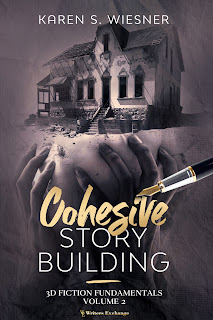Recently reading WINTER LOST, the latest Mercy Thompson contemporary fantasy by Patricia Briggs, I thought about a problem authors often have in maintaining readers' interest with long-running series (aside from genres such as detective fiction, in which each installment can be relatively self-contained): The threats faced by the protagonist need to escalate over time. I once came across a piece of writing advice about the craft of series plotting -- I can't remember the commentator or what author he was referring to -- that mentioned this problem in connection with a hero who rose to the height of saving the solar system and, in the following book, saved his boss's job. One trouble with increasingly dire threats and more powerful antagonists, of course, is that the hero or heroine has to get progressively stronger to defeat them.
Consider the Anita Blake series, by Laurell K. Hamilton. In the first book, she's a necromancer who raises dead people temporarily so they can answer questions such as who murdered them or where they hid the will. She has a fraught, semi-antagonistic relationship with the local master vampire. Over the course of many novels, she grows in power while becoming ever more deeply entangled in supernatural politics and hostilities. I can't say what she's doing now, because I gave up on her a while back. Not only because of her multispecies harem, a reason numerous former fans stopped reading the series. I actually LIKE steamy paranormal romance, up to a point; I've written a fair bit of it myself. Yet I eventually found Anita's complicated sex life tedious, something I once wouldn't have thought possible. The other, more substantive reason I and many others got tired of her, however, was her constant acquisition of new powers. She seemed well on the way to becoming superhuman, like a Dungeons and Dragons character leveling up after every adventure. And I like D and D, too, but I found Anita becoming less and less believable.
Patricia Briggs handles her protagonist's response to escalating threats differently. Mercy is a coyote shapeshifter raised by werewolves, now married to the alpha of a werewolf pack. She doesn't transform into a ferocious beast capable of destroying almost any foe. She changes into a thirty-five-pound coyote. In that form, she has the animal's agility, speed, and keen senses, but no superpowers. She sort of possesses an ancient artifact, a magical walking stick, that comes to her hand when needed (usually). As a daughter of Coyote, the Native American trickster deity, she sometimes gets help from her father, but it can't be relied on consistently; after all, he's a trickster. After marrying the alpha werewolf, she gets the benefit of a psychic bond with him and, though him, access to the pack bonds. In short, although a paranormal creature, she isn't superhuman, just different. Yet, in an alternate present-day world that contains werewolves, other shapeshifters, vampires, fae, ghosts, and even minor deities, she does confront and manage to cope with increasingly dire dangers over the course of the series. In WINTER LOST, she faces the possiblity of Ragnarok, the end of the world. She doesn't avert it singlehandedly, though. The author gives her powerful allies -- balanced by formidable enemies. She relies on her intelligence, flexibility, and capacity to draw on friendships forged over time, not on inflated powers. Thus, she never becomes unsympathetic or unbelievable as a character.
Buffy the Vampire Slayer averts the overpowered protagonist trap in similar ways. She saves the world, or at least Sunnydale, so often she has to ponder the plural of "apocalypse." But her Slayer abilities don't change much over the seven seasons of the TV show. Rather, she gradually learns more about the background of her Slayer lineage and becomes wiser both in the use of her gifts and in dealing with the many nonhuman characters and entities, friend and foe, she encounters. Like Mercy Thompson, Buffy vanquishes evil with the help of many allies, including Giles, her Watcher; two re-souled vampires, Angel and later Spike; her best friends, Willow and Xander; and two other Slayers accidentally "called" in succession even though there's supposed to be only one at a time. If anybody in the series becomes overpowered, it's Willow with the expansion of her witchcraft in the concluding seasons, but she's a sidekick, not the protagonist. Moreover, she turns evil for a while toward the end, an antagonist who must be redeemed rather than an ally. Her final grand surge of magic that transforms all "potentials" into active Slayers provides Buffy with the support she needs to defeat the Big Bad of the last season.
The idea of multiple apocalypses reminds me of a scene from the beginning of Spider Robinson's CALLAHAN'S KEY. Callahan's Bar has been destroyed (it gets rebuilt later, naturally), and the narrator/protagonist, Jake, lives in straitened circumstances as his wife suffers through a difficult pregnancy. At a con where I was fortunate to be able to see Robinson in person, he read that scene, in which Jake's closest friends from Callahan's pay him an unexpected visit. They inform him, "We need you to save the universe." Jake replies in an exasperated outburst, "Again?!" That line got a huge laugh from the audience. Jake, of course, does save the universe, but like Buffy, not alone -- with his Callahan's Bar found family.
Margaret L. Carter
Please explore love among the monsters at Carter's Crypt.







































